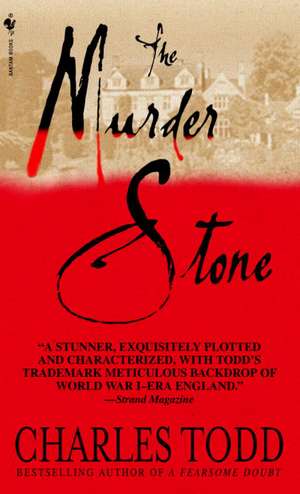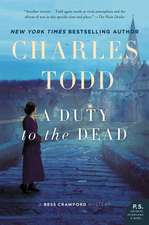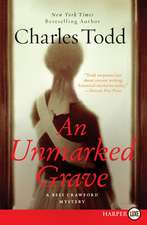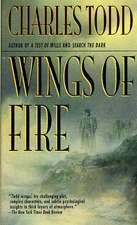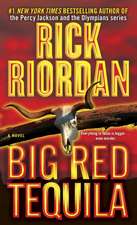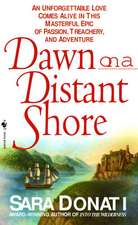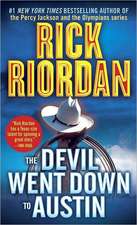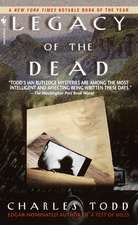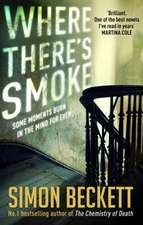The Murder Stone
Autor Charles Todden Limba Engleză Paperback – 31 iul 2004
The Murder Stone
The Great War is still raging in the autumn of 1916, when Francesca Hatton’s beloved grandfather dies on the family estate in
England’s isolated Exe Valley. Grieving for the man who raised her, Francesca is stunned to find an unsigned letter among his effects, cursing the Hattons and their descendants. Now a stranger has shown up on her doorstep, accusing her grandfather of being a murderer.
Ex-soldier Richard Leighton blames Francis Hatton for the death of his mother, who vanished nearly a quarter of a century earlier. Her body was never found, only a shawl stained with her blood. And Leighton is not the only one with a claim on Francesca’s grandfather. On the day of his funeral, unexpected visitors arrive with the mourners, and Francesca is besieged by charges of Hatton’s vicious dealings. Yet there is also a shy young woman who praises his secret generosity.
At the center of the intrigue is an unusual white stone that lies hidden in a secluded garden where Francesca once played with her five male cousins, all of them dead now on the battlefields of France. According to the terms of Hatton’s will, the Murder Stone must be dug up and transported to Scotland, where it is to be buried forever. But before Francesca can begin the journey, a series of ominous “accidents” occur, culminating in the discovery of a bleeding body on the Murder Stone itself.
Was Hatton the loving, caring protector his granddaughter always believed him to be?
Or a vindictive, secretive man who cultivated dangerous enemies? Francesca sets out in pursuit of the truth—and into the sights of someone determined to exact a revenge long overdue.
From the Hardcover edition.
Preț: 51.16 lei
Nou
Puncte Express: 77
Preț estimativ în valută:
9.79€ • 10.26$ • 8.09£
9.79€ • 10.26$ • 8.09£
Carte disponibilă
Livrare economică 21 martie-04 aprilie
Preluare comenzi: 021 569.72.76
Specificații
ISBN-13: 9780553586602
ISBN-10: 0553586602
Pagini: 416
Dimensiuni: 106 x 176 x 29 mm
Greutate: 0.24 kg
Ediția:Bantam Mass Mar.
Editura: Bantam
ISBN-10: 0553586602
Pagini: 416
Dimensiuni: 106 x 176 x 29 mm
Greutate: 0.24 kg
Ediția:Bantam Mass Mar.
Editura: Bantam
Notă biografică
CHARLES TODD is the author of A Fearsome Doubt, Watchers of Time, Legacy of the Dead, A Test of Wills, Wings of Fire, and Search the Dark. He lives on the East Coast, where he is at work on the next novel in the Inspector Ian Rutledge series, A Cold Treachery, which Bantam will publish in spring 2005.
Extras
CHAPTER 1
Devon, Autumn, 1916
It always stood in the back garden--what my cousins called the Murder Stone.
They teased me about it often enough.
"Put your head here, and your brains will be bashed out."
"Lie down here, and the headsman will come and chop your neck!"
Nasty little beasts, I thought them then. But they're all dead now. Lost at Mons and Ypres, Passchendaele and the Somme. Their laughter stilled, their teasing no more than a childhood memory. Their voices a distant echo I hear sometimes in my dreams.
"Do be quiet, Cesca! We're hiding from the Boers--you'll give us away!"
But The Murder Stone is still there, at the bottom of my grandfather's garden, where it has always been.
And the house above the garden is mine, now. I've inherited it by default, because all the fair-haired boys are dead, gone to be real soldiers at last and mown down with their dreams of glory.
CHAPTER 2
It seemed quite strange to be sitting here--alone--in the solicitor's office, without her grandfather beside her.
Francis Hatton had always had a powerful presence. An impressive man physically as well: tall, strongly built, with broad shoulders and that air of good breeding Englishmen wear so confidently. Someone to be reckoned with. Women had found him attractive, even in age.
He had carried his years well, in fact, his face lean and handsome, his voice deep and resonant, his hair a distinguished silver gray.
Until 1915.
In 1915 the first of the cousins died in France. They had hardly had time to grieve for Simon when Robin was killed at the Front. Freddy and Peter soon followed, and Francesca watched each blow take its toll. The man she had always adored had become someone she barely recognized. Silent--dark. And then Harry died . . .
She stirred in her chair. Mr. Branscombe had always toadied to Francis Hatton. The solicitor fussed with the papers before him now, setting the box marked HATTON aside and uncapping his inkwell, as if hoping to delay matters until his true client arrived. Reluctant somehow to begin this final duty.
And had she failed in her own duty to her grandfather? She had hated the change in him, that gradual withdrawal into himself, leaving her behind. Instead of mourning together, for the first time in her life she had felt shut out of his love. When Harry died on the Somme in the late summer of 1916--scarcely two months ago--she had witnessed Francis Hatton's descent into despair.
In the weeks following his stroke she had prayed for her grandfather's death, and at night, walking the passages in restless repudiation of approaching death, she had wished with increasing fervor that she could hasten it, and be done with it at last. For his sake. For release . . .
A surge of guilt pressed in on her.
Mr. Branscombe cleared his throat, an announcement that he was ready to begin the Reading of the Will. Ceremony duly noted . . .
The servants--the older ones, the younger ones having gone off one by one either to fight or to work in the factories--were in an anteroom, waiting to be invited into the inner sanctum at the proper moment.
" 'I, Charles Francis Stewart Hatton, being of Sound Mind and Body, do hereby set my Hand to this, my Last Will and Testament . . .' "
The Devon voice was sonorously launched on its charge.
Francesca found it difficult to concentrate.
My grandfather is only just dead, she wanted to cry. This smacks of sacrilege, to be dividing up his goods and chattels before he's quite cold . . . I haven't earned the right to sit here. Oh, God.
But who else was there to sit in this room and mark a great man's passing? She was the last of the Hattons. A long and distinguished line had trickled down to one girl.
Mr. Branscombe paused, glancing over the rims of his spectacles at her, as if sensing her distraction.
"Are you with me thus far, Miss Hatton--?"
"Yes," she answered, untruthfully.
He seemed far from satisfied, regarding her intently before returning to the document.
Francesca felt pinned to the hard, uncomfortable chair provided for the solicitor's clients--chosen, she was certain, to prevent them from overstaying their welcome--and wished she had the courage to stop him altogether. But listening was her duty, even if she cared little about provisions for her future, and she had absolutely no idea what she ought to do about the house at River's End. Close it? Live there? Sell it?
Ask me next month--next year! I'm so weary--
It was haunted, River's End. Not by ghosts who clanked and howled, but by the lost souls who were never coming back to it. She could almost feel them, standing at the bottom of the stairs each night as she climbed to her room. Shadows that grieved for substance, so that they too could come home again.
It was a stupid obsession on her part, and she hadn't told anyone of it. But the old black dog also seemed to sense their presence, and ran up the stairs ahead of her, as if afraid to be left behind among them.
Just that morning the rector had said, worried about her, "This is such a large, rambling house for a woman alone. Won't you come to us at the Rectory and stay a few days? It will do you good, and my housekeeper will take pleasure in your company . . ."
But Francesca had explained to him that the house was all that was left of home and family. An anchor in grief, where she could still feel loved. She knew its long dark passages so well, and its many rooms with their drapes pulled tight, the black wreath over the door knocker. River's End was peaceful, after the tumult of her grandfather's dying. And the ghosts were, after all, of her blood.
Mrs. Lane came in to cook and to clean. It was enough. There was the old dog Tyler for company, and the library when she tired of her own thoughts. Her grandfather's tastes had run to war and politics, history and philosophy. Hardly the reading for a woman suffering from insomnia. Although twice Plato had put her soundly to sleep--
She became aware of the silence in the room. Mr. Branscombe had finished and was waiting for her to acknowledge that fact.
"Quite straightforward, is it not?" she said, dragging her attention back to the present.
"In essence," he agreed weightily, "it is indeed. Everything comes to you. Save for the usual bequests to the remaining servants and to the church, and of course to several charitable societies which have benefited from your grandfather's generosity in the past."
"Indeed," she responded, trying to infuse appreciation into her voice.
"It's an enormous responsibility," Mr. Branscombe reminded her.
"I understand that." What might once have been shared equally with the cousins would be hers. She would rather have had the cousins--
It was clear that Mr. Branscombe was uncomfortable with a woman dealing with such a heavy obligation. He fiddled with the edges of the blotter, and when no questions were forthcoming, he asked, "Do you wish to keep the properties in Somerset and Essex? I must warn you that this is not a propitious time to sell--in the middle of a war--"
He had her full attention now, as she stifled her surprise.
"Properties--?"
His thin lips pinched together in a tight line, as if he'd finally caught her out, as he had known he would.
Trying to recoup his good opinion of her and conceal her ignorance, she asked, thinking it through, "Were these estates destined for my cousins? You see, my grandfather told me very little about them."
He told me nothing--
"The properties have been in his possession for many years. Quite sizable estates, in fact. Whether he intended to settle either of them on one of his male heirs in due course, I don't know. He didn't confide in me." It was grudgingly admitted. "I can tell you that the property in Hampshire that belonged to your uncle, Tristan Hatton, was sold at the time of his death. It would have been prudent for your grandfather to provide in some other fashion for his eldest grandson. Sadly, Mr. Simon Hatton is also deceased."
Simon. The first of the cousins to go to war . . . the first to die.
Francesca was still trying to absorb the fact that her grandfather had owned other estates. But if it was true, why had he always chosen to live in the isolated Exe Valley? It was the only home she had ever known. And as far as she was aware, that was true of her cousins as well. Even Simon had had only the haziest memory of his parents.
Why had he never taken us to visit houses in Somerset or Essex, if they were his? There hadn't been so much as a casual, "Shall we spend Christmas in Somerset this year?" Or "Since the weather is so fine, we might travel to Essex for a week. I ought to have a look at the tenant roofs. . . ." If he had gone there at all, it had been in secret.
The thought was disturbing. Why should secrecy have been necessary? Hadn't he trusted her? Or had he never got around to telling her, after Simon was killed? Or at Harry's death? The last of the five grandsons to die. Francis Hatton had abandoned interest in everything then, including the will to live . . .
"Before I summon the servants to hear their bequests, there is one other matter that your grandfather wished you to deal with. A recent Codicil, in fact."
"Indeed?" she said again, still wrestling with the puzzle of the properties.
"It involves the Murder Stone, whatever that may be."
Caught completely unawares, Francesca stared at him. "But--that's nothing more than a jest--a largish white stone in the back garden that my cousins were always making a part of their games!"
"Nevertheless, your grandfather has included in his will a provision for its removal from Devon to Scotland."
"Scotland? My grandfather has never been to Scotland in his life!"
"That may very well be true, Miss Hatton. But I shall read you the provision: 'I place upon my heir the solemn duty of taking the object known to her as the Murder Stone from its present location and carrying it by whatever means necessary to Scotland, to be buried in the furthermost corner of that country as far away from Devon as can be reached safely.' " He returned the Codicil to the will, and cleared his throat again. "I was summoned to River's End after his stroke especially to add this clause."
Mystified, Francesca said, "The deaths of my cousins must surely have turned his mind--"
"Perhaps this stone reminded him too forcibly of their lost youth," Branscombe suggested gravely, with an insight she had not thought he possessed. "When men are old and ill, small things tend to loom large."
Francesca shook her head. "It's such an insignificant matter . . ."
"Perhaps to you, my dear. But I assure you, to your grandfather it was quite important. I was under the impression that Mr. Hatton was--um--extraordinarily superstitious--about this matter. Speaking to me about this stone seemed to agitate him. The nurse had cautioned me not to allow him to exert himself unnecessarily. And thus I neither questioned nor inquired but wrote his words down directly as he spoke them."
"My grandfather was never superstitious! And he allowed my cousins to use the stone as they pleased. It was always a part of our games--we were never warned away."
"I have no answer to that. But I can assure you that this responsibility is yours and must be regarded as a binding charge. He was absolutely adamant on that score."
"But surely not right away--not while the war is going on?" She couldn't begin to imagine how she would manage to dig up the stone--it most certainly weighed more than the elderly gardener and the coachman put together! There was no one else who could be spared for such work--help was short as it was. And how could she arrange for it to travel to Scotland, when petrol and tires were so dear? It was an enormous undertaking, and one she couldn't face just now.
"At your earliest convenience, of course." Branscombe's tone indicated disapproval of using war as an excuse.
Francesca was about to protest, but the solicitor sat waiting for her to agree to the terms of the Codicil, as if her grandfather's unfathomable anxiety had invaded him as well. She nodded and was relieved when he finally seemed to be satisfied.
He set aside the thick sheets of the will. "I have already taken it upon myself to send a Death Notice to the Times. And I've ordered the grave to be opened, and instructed the rector that the services are to be held on Friday of this week. If that's agreeable . . ."
Whether it was or not, she couldn't do much about it. Men arranged such matters, as a rule. And all the cousins were dead. . . .
There were other papers in the box labeled HATTON in a fine, antique copperplate. Most likely Branscombe the Elder's hand. "What else is in there? Besides the will?" More surprises? Other secrets?
"Our family has always handled the legal affairs of your family," Branscombe reminded her with satisfaction, glancing at the contents. He plucked out several folded documents. "Here we have your great-grandfather Thomas's will, and this is Francis Hatton's grandfather George. He fought at Waterloo with the great Duke of Wellington. His grandfather Frederick was with Cumberland at Culloden. Amazing history, is it not?" A reminder that she would be expected to leave her own affairs with the firm that had mounted guard over it for generations.
On the papers she could see the faded handwriting. A family's continuity preserved in old ink . . . It was a heritage she had been taught to revere. The Hattons had always served their country well. She, the only girl in a family of six cousins, had been expected to do the same. It was why she had volunteered to serve with the Red Cross in London.
"All quite regular and in order." Branscombe returned the documents to the box with affection, as if he counted them old friends. "Ah. There's also a letter here that your grandfather deposited with the firm--"
"May I see it?"
"I know of no reason why you mayn't. As heir . . ." He lifted it out of the box and passed it across the desk to her.
Curious, she examined it. It was wrapped in a piece of parchment on which was inscribed over the seal in her grandfather's beautiful hand, "To be held and not acted upon."
From the Hardcover edition.
Devon, Autumn, 1916
It always stood in the back garden--what my cousins called the Murder Stone.
They teased me about it often enough.
"Put your head here, and your brains will be bashed out."
"Lie down here, and the headsman will come and chop your neck!"
Nasty little beasts, I thought them then. But they're all dead now. Lost at Mons and Ypres, Passchendaele and the Somme. Their laughter stilled, their teasing no more than a childhood memory. Their voices a distant echo I hear sometimes in my dreams.
"Do be quiet, Cesca! We're hiding from the Boers--you'll give us away!"
But The Murder Stone is still there, at the bottom of my grandfather's garden, where it has always been.
And the house above the garden is mine, now. I've inherited it by default, because all the fair-haired boys are dead, gone to be real soldiers at last and mown down with their dreams of glory.
CHAPTER 2
It seemed quite strange to be sitting here--alone--in the solicitor's office, without her grandfather beside her.
Francis Hatton had always had a powerful presence. An impressive man physically as well: tall, strongly built, with broad shoulders and that air of good breeding Englishmen wear so confidently. Someone to be reckoned with. Women had found him attractive, even in age.
He had carried his years well, in fact, his face lean and handsome, his voice deep and resonant, his hair a distinguished silver gray.
Until 1915.
In 1915 the first of the cousins died in France. They had hardly had time to grieve for Simon when Robin was killed at the Front. Freddy and Peter soon followed, and Francesca watched each blow take its toll. The man she had always adored had become someone she barely recognized. Silent--dark. And then Harry died . . .
She stirred in her chair. Mr. Branscombe had always toadied to Francis Hatton. The solicitor fussed with the papers before him now, setting the box marked HATTON aside and uncapping his inkwell, as if hoping to delay matters until his true client arrived. Reluctant somehow to begin this final duty.
And had she failed in her own duty to her grandfather? She had hated the change in him, that gradual withdrawal into himself, leaving her behind. Instead of mourning together, for the first time in her life she had felt shut out of his love. When Harry died on the Somme in the late summer of 1916--scarcely two months ago--she had witnessed Francis Hatton's descent into despair.
In the weeks following his stroke she had prayed for her grandfather's death, and at night, walking the passages in restless repudiation of approaching death, she had wished with increasing fervor that she could hasten it, and be done with it at last. For his sake. For release . . .
A surge of guilt pressed in on her.
Mr. Branscombe cleared his throat, an announcement that he was ready to begin the Reading of the Will. Ceremony duly noted . . .
The servants--the older ones, the younger ones having gone off one by one either to fight or to work in the factories--were in an anteroom, waiting to be invited into the inner sanctum at the proper moment.
" 'I, Charles Francis Stewart Hatton, being of Sound Mind and Body, do hereby set my Hand to this, my Last Will and Testament . . .' "
The Devon voice was sonorously launched on its charge.
Francesca found it difficult to concentrate.
My grandfather is only just dead, she wanted to cry. This smacks of sacrilege, to be dividing up his goods and chattels before he's quite cold . . . I haven't earned the right to sit here. Oh, God.
But who else was there to sit in this room and mark a great man's passing? She was the last of the Hattons. A long and distinguished line had trickled down to one girl.
Mr. Branscombe paused, glancing over the rims of his spectacles at her, as if sensing her distraction.
"Are you with me thus far, Miss Hatton--?"
"Yes," she answered, untruthfully.
He seemed far from satisfied, regarding her intently before returning to the document.
Francesca felt pinned to the hard, uncomfortable chair provided for the solicitor's clients--chosen, she was certain, to prevent them from overstaying their welcome--and wished she had the courage to stop him altogether. But listening was her duty, even if she cared little about provisions for her future, and she had absolutely no idea what she ought to do about the house at River's End. Close it? Live there? Sell it?
Ask me next month--next year! I'm so weary--
It was haunted, River's End. Not by ghosts who clanked and howled, but by the lost souls who were never coming back to it. She could almost feel them, standing at the bottom of the stairs each night as she climbed to her room. Shadows that grieved for substance, so that they too could come home again.
It was a stupid obsession on her part, and she hadn't told anyone of it. But the old black dog also seemed to sense their presence, and ran up the stairs ahead of her, as if afraid to be left behind among them.
Just that morning the rector had said, worried about her, "This is such a large, rambling house for a woman alone. Won't you come to us at the Rectory and stay a few days? It will do you good, and my housekeeper will take pleasure in your company . . ."
But Francesca had explained to him that the house was all that was left of home and family. An anchor in grief, where she could still feel loved. She knew its long dark passages so well, and its many rooms with their drapes pulled tight, the black wreath over the door knocker. River's End was peaceful, after the tumult of her grandfather's dying. And the ghosts were, after all, of her blood.
Mrs. Lane came in to cook and to clean. It was enough. There was the old dog Tyler for company, and the library when she tired of her own thoughts. Her grandfather's tastes had run to war and politics, history and philosophy. Hardly the reading for a woman suffering from insomnia. Although twice Plato had put her soundly to sleep--
She became aware of the silence in the room. Mr. Branscombe had finished and was waiting for her to acknowledge that fact.
"Quite straightforward, is it not?" she said, dragging her attention back to the present.
"In essence," he agreed weightily, "it is indeed. Everything comes to you. Save for the usual bequests to the remaining servants and to the church, and of course to several charitable societies which have benefited from your grandfather's generosity in the past."
"Indeed," she responded, trying to infuse appreciation into her voice.
"It's an enormous responsibility," Mr. Branscombe reminded her.
"I understand that." What might once have been shared equally with the cousins would be hers. She would rather have had the cousins--
It was clear that Mr. Branscombe was uncomfortable with a woman dealing with such a heavy obligation. He fiddled with the edges of the blotter, and when no questions were forthcoming, he asked, "Do you wish to keep the properties in Somerset and Essex? I must warn you that this is not a propitious time to sell--in the middle of a war--"
He had her full attention now, as she stifled her surprise.
"Properties--?"
His thin lips pinched together in a tight line, as if he'd finally caught her out, as he had known he would.
Trying to recoup his good opinion of her and conceal her ignorance, she asked, thinking it through, "Were these estates destined for my cousins? You see, my grandfather told me very little about them."
He told me nothing--
"The properties have been in his possession for many years. Quite sizable estates, in fact. Whether he intended to settle either of them on one of his male heirs in due course, I don't know. He didn't confide in me." It was grudgingly admitted. "I can tell you that the property in Hampshire that belonged to your uncle, Tristan Hatton, was sold at the time of his death. It would have been prudent for your grandfather to provide in some other fashion for his eldest grandson. Sadly, Mr. Simon Hatton is also deceased."
Simon. The first of the cousins to go to war . . . the first to die.
Francesca was still trying to absorb the fact that her grandfather had owned other estates. But if it was true, why had he always chosen to live in the isolated Exe Valley? It was the only home she had ever known. And as far as she was aware, that was true of her cousins as well. Even Simon had had only the haziest memory of his parents.
Why had he never taken us to visit houses in Somerset or Essex, if they were his? There hadn't been so much as a casual, "Shall we spend Christmas in Somerset this year?" Or "Since the weather is so fine, we might travel to Essex for a week. I ought to have a look at the tenant roofs. . . ." If he had gone there at all, it had been in secret.
The thought was disturbing. Why should secrecy have been necessary? Hadn't he trusted her? Or had he never got around to telling her, after Simon was killed? Or at Harry's death? The last of the five grandsons to die. Francis Hatton had abandoned interest in everything then, including the will to live . . .
"Before I summon the servants to hear their bequests, there is one other matter that your grandfather wished you to deal with. A recent Codicil, in fact."
"Indeed?" she said again, still wrestling with the puzzle of the properties.
"It involves the Murder Stone, whatever that may be."
Caught completely unawares, Francesca stared at him. "But--that's nothing more than a jest--a largish white stone in the back garden that my cousins were always making a part of their games!"
"Nevertheless, your grandfather has included in his will a provision for its removal from Devon to Scotland."
"Scotland? My grandfather has never been to Scotland in his life!"
"That may very well be true, Miss Hatton. But I shall read you the provision: 'I place upon my heir the solemn duty of taking the object known to her as the Murder Stone from its present location and carrying it by whatever means necessary to Scotland, to be buried in the furthermost corner of that country as far away from Devon as can be reached safely.' " He returned the Codicil to the will, and cleared his throat again. "I was summoned to River's End after his stroke especially to add this clause."
Mystified, Francesca said, "The deaths of my cousins must surely have turned his mind--"
"Perhaps this stone reminded him too forcibly of their lost youth," Branscombe suggested gravely, with an insight she had not thought he possessed. "When men are old and ill, small things tend to loom large."
Francesca shook her head. "It's such an insignificant matter . . ."
"Perhaps to you, my dear. But I assure you, to your grandfather it was quite important. I was under the impression that Mr. Hatton was--um--extraordinarily superstitious--about this matter. Speaking to me about this stone seemed to agitate him. The nurse had cautioned me not to allow him to exert himself unnecessarily. And thus I neither questioned nor inquired but wrote his words down directly as he spoke them."
"My grandfather was never superstitious! And he allowed my cousins to use the stone as they pleased. It was always a part of our games--we were never warned away."
"I have no answer to that. But I can assure you that this responsibility is yours and must be regarded as a binding charge. He was absolutely adamant on that score."
"But surely not right away--not while the war is going on?" She couldn't begin to imagine how she would manage to dig up the stone--it most certainly weighed more than the elderly gardener and the coachman put together! There was no one else who could be spared for such work--help was short as it was. And how could she arrange for it to travel to Scotland, when petrol and tires were so dear? It was an enormous undertaking, and one she couldn't face just now.
"At your earliest convenience, of course." Branscombe's tone indicated disapproval of using war as an excuse.
Francesca was about to protest, but the solicitor sat waiting for her to agree to the terms of the Codicil, as if her grandfather's unfathomable anxiety had invaded him as well. She nodded and was relieved when he finally seemed to be satisfied.
He set aside the thick sheets of the will. "I have already taken it upon myself to send a Death Notice to the Times. And I've ordered the grave to be opened, and instructed the rector that the services are to be held on Friday of this week. If that's agreeable . . ."
Whether it was or not, she couldn't do much about it. Men arranged such matters, as a rule. And all the cousins were dead. . . .
There were other papers in the box labeled HATTON in a fine, antique copperplate. Most likely Branscombe the Elder's hand. "What else is in there? Besides the will?" More surprises? Other secrets?
"Our family has always handled the legal affairs of your family," Branscombe reminded her with satisfaction, glancing at the contents. He plucked out several folded documents. "Here we have your great-grandfather Thomas's will, and this is Francis Hatton's grandfather George. He fought at Waterloo with the great Duke of Wellington. His grandfather Frederick was with Cumberland at Culloden. Amazing history, is it not?" A reminder that she would be expected to leave her own affairs with the firm that had mounted guard over it for generations.
On the papers she could see the faded handwriting. A family's continuity preserved in old ink . . . It was a heritage she had been taught to revere. The Hattons had always served their country well. She, the only girl in a family of six cousins, had been expected to do the same. It was why she had volunteered to serve with the Red Cross in London.
"All quite regular and in order." Branscombe returned the documents to the box with affection, as if he counted them old friends. "Ah. There's also a letter here that your grandfather deposited with the firm--"
"May I see it?"
"I know of no reason why you mayn't. As heir . . ." He lifted it out of the box and passed it across the desk to her.
Curious, she examined it. It was wrapped in a piece of parchment on which was inscribed over the seal in her grandfather's beautiful hand, "To be held and not acted upon."
From the Hardcover edition.
Recenzii
"Family upheaval intensified by wartime tragedy."
--Kirkus Reviews
--Kirkus Reviews
Descriere
The Edgar Award-nominated and bestselling author of "A Fearsome Doubt" delivers this mesmerizing, stand-alone novel, set in England during World War I. "Many twists and turns, angst-ridden characters, and an evocative historical setting. A gripping read."--"Library Journal."
